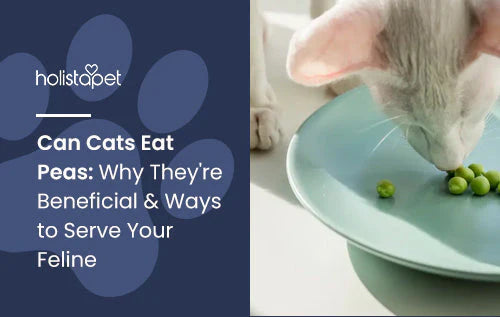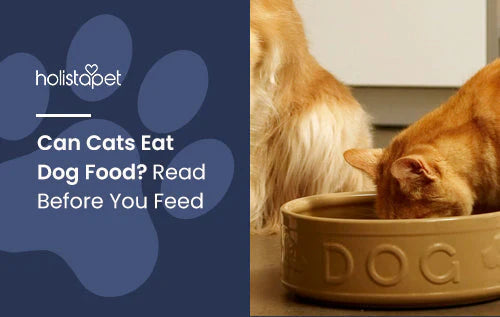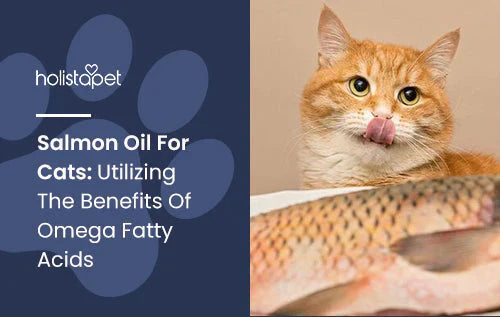You're making dinner - maybe a chicken pot pie or a side of peas and carrots - and in your busyness, a few peas drop on the floor. Your cat, always on alert, pounces on them. Then comes the nervous feelings every pet owner has in this situation, "Can cats eat peas?" The dos and dont's of what to feed your cat can be extremely confusing sometimes. No dairy (that makes sense), no tuna (really?), but what about peas? Read on to find out!

Can Cats Eat Peas?
So, can cats have pease? The short answer is yes! Cats can safely eat all kinds of peas. They're packed with healthy nutrients and are an excellent snack or addition to their normal food. Some commercial dog food and cat food actually add peas to their formula, so you can generally ignore those errant peas that your cat munches on while you're cooking.
Related: Wet Food Vs Dry Cat Food: Why It Matters & What to Look For
Types of Peas
There are 3 main types of peas, all of which are great for cats:
- English Peas: These are also known as garden peas and are the classic peas that come to mind when you think of "peas in a pod" or "peas and carrots." English peas have smooth green pods that contain the plump, round seeds we love to eat. The pods are tough and cannot be digested, so these peas must be shelled. But don't worry, you can easily buy these shelled or frozen at your supermarket.
- Snow Peas: Popular in Chinese cuisine, snow peas are easily recognizable because of their flat shape and small seeds inside. Differing from English peas, these are actually grown to be eaten whole, pod and all.
- Sugar Snap Peas: These are the peas with that satisfying crunch! Snap peas are a hybrid of snow peas and English peas, so it's kind of the best of both worlds; you have round seeds and a crisp, edible pod. These look pretty similar to English peas, but their pods have a rounder, more cylindrical shape. So, peas are a great snack for cats...most of the time. There are a few cat-veats though (sorry, I couldn't help it!).
Reminders When Feeding Peas to Cats
As with most rules, there's always a "but." Yes, peas are healthy and good for cats, BUT there are a few things to be aware of when feeding peas or pea-related foods to cats.

- Beware The Everlasting Pea Plant: The Everlasting Pea Plant, also known as the Sweet Pea or Perennial Pea, is a member of the Fabaceae family and is toxic to domestic animals, horses, and even humans. Luckily the Everlasting Pea is a garden plant and typically not eaten, except by the curious pet or animal. But if accidentally ingested, it can cause vomiting, diarrhea, lethargy, and even death - so make sure you know how to spot it.
- Avoid Seasonings: I know some of you are heavy-handed with the salt shaker, but make sure you don't dump salt on the peas you feed your cat. Cats should not eat anything with seasoning because it will upset their stomach and cause health problems. This includes salt and cayenne pepper to name a few. Garlic and onions should definitely be avoided as well because these are toxic to cats. On that note, try to avoid canned peas because they have much higher sodium content compared to fresh peas.
- Maybe Just Avoid The Whole Pod: It might be a good idea to just avoid the whole pod. While some pods are edible (like snow peas and sugar snap peas), some are way too tough and cannot be eaten (like the English pea). This is also a way to reduce the chance of your cat choking on the fibrous pods. As a rule of thumb, it's best to only feed cats the plump, nutrition-rich seeds.
- Remember, Cats Are Carnivores: Peas are wonderful and all, but remember that your cat is a meat eater. They need a meat-based (not vegetable-based) diet. Think about it — if your cat escaped would they wander to the produce section of a grocery store to chow down on some peas? Probably not. The majority of their diet should be meat, so don't try to override their evolutionary needs
What Are the Benefits of Peas for Cats?
With peas, the nutritional benefits are plenty! There's a reason why your mom always made you eat them; now it's your turn to make your cat eat them!

Vitamins and Minerals
First and foremost, the obvious benefit: vitamins and minerals. Peas are packed with vitamins A, B1, B6, C, and K; all of which aid in the health of your cat's eyes, muscles, nerves, skin, immune system, and bones. They are also full of dietary minerals (manganese, copper, potassium, and iron), which are absolutely essential for health. Other noteworthy nutritional benefits include lutein — also known as the eye vitamin — which supports the health of your cat's razor-sharp eyes, and linoleic acid, a fatty acid that helps maintain your cat's skin and fur.
Other Benefits
Peas offer several additional benefits that can contribute to your cat's overall health and well-being:
- Supports Healthy Digestion: Peas are rich in dietary fiber, which plays a crucial role in maintaining a healthy digestive system. Fiber helps regulate your cat's bowel movements and can be especially beneficial if your cat occasionally struggles with constipation. By promoting regularity, fiber helps keep the gastrointestinal tract functioning smoothly, reducing the risk of digestive discomfort.
- Provides a Natural Energy Boost: Peas are a good source of carbohydrates, which serve as a quick and natural energy source for your cat. While cats primarily rely on protein for energy, the carbohydrates in peas can provide an extra boost, helping your feline stay active and energetic. Whether your cat enjoys climbing railings, darting up and down stairs, or scaling tall cat trees, peas can help fuel their playful antics.
- Helps with Weight Management: If your cat is carrying a bit of extra weight, peas can be a helpful addition to their diet. Peas are naturally low in calories, making them a healthy, guilt-free snack alternative. By substituting higher-calorie treats with peas, you can help your cat slim down while still satisfying their need for snacks. This can be particularly beneficial for cats prone to obesity, as maintaining a healthy weight is essential for preventing obesity-related diseases like diabetes and joint issues.
How Should Peas Be Served to Cats?
The possibilities are many! Peas can be served fresh from the market or cooked on a pan. Also, because they're so small, they're wonderfully versatile; you can easily use them as a tasty snack or mix them into your cat's meal. If you want to serve them frozen, just make sure they're still soft enough to be chewed. If you're going to cook them, don't cook them how you like to eat them. Meaning no salt, no pepper, and no oil on these peas. The less seasoning and the simpler the cooking, the better! And like we mentioned before, just toss the pods.
CBD Options
Some CBD treats, like our CBD calming chews for cats have a vast number of beneficial ingredients - including peas! CBD, also known as cannabidiol, is a natural compound commonly found in hemp plants. It's non-pyschoactive, which means that it won't get your cat high nor will they feel any sensations that you'd associate with THC. Like humans, cats have an endocannabinoid system, or ECS for short. The ECS is what regulates a number of functions within our body, including sleep, appetite, digestion, and much more!
Pea Alternatives for Cats
Okay, so you've been feeding your cat peas and you're wondering if there's anything else you can throw into the pet food mix? There are actually many vegetables your cat can enjoy, including:
- Carrots: These must be cooked through because carrots are way too hard for cats to eat raw. But when cooked and cut up small, they're an excellent source of Vitamin A and other minerals.
- Broccoli: They're a great source of nutrients and antioxidants. Also, if your cat is the type to chew on plants, broccoli might be the key to curbing that addiction.
- Zucchini: Your cat might freak out when it sees one (if you haven't seen the videos, look them up!), but that doesn't mean they don't like them. Zucchinis are great for cat health and include magnesium, potassium, and manganese.
- Winter Squash: These are much more than just great Fall decor. Winter squash is packed with fiber, which helps maintain digestive health and relieve any bowel issues like constipation or diarrhea.
- Fruit: What fruits can cats eat? Blueberry and strawberry are packed with antioxidants and vitamins, while watermelon provides hydration with its high water content. However, always ensure the fruits you offer are safe for cats, avoiding toxicity with ones like grape or citrus fruits.
- HolistaPet's CBD Calming Chews: Our CBD Calming Chews for Cats are packed with beneficial ingredients, including peas! These soft cat treats are delicious, nutritious, and 100% Grain-Free! These CBD Calming Chews are packed with flavor and are tailored to promote appetite and sleep, can help cats improve their moods, and much more!
Final Thoughts - Can Cats Eat Peas?
So you're back in the kitchen and whoops - there goes some peas. But this time you don't even break a sweat and wonder "can cats have green beans" when your pet curiously wanders over. Cats can definitely eat peas! In fact, it's encouraged! Peas are simple to prepare (they can even be eaten raw), small enough for cats to easily eat, and a great source of vitamins and minerals. Just don't load them with additives or seasoning; the simpler the better when it comes to giving your cat vegetables.







![Probiotics For Dogs [Soft Chews] - HolistaPet](http://www.holistapet.com/cdn/shop/files/Probiotic-Infographic-1_472d7a29-e30c-435a-9638-1365d8c3a9f9.jpg?v=1725384841&width=104)




























Leave a comment
All comments are moderated before being published.
This site is protected by hCaptcha and the hCaptcha Privacy Policy and Terms of Service apply.